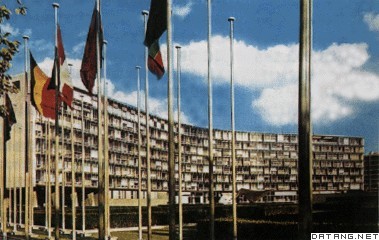1) school organizational culture


学校组织文化
1.
The development of foreign school organizational culture theory is more dependent on the nutrition taken from the organizational theory.
国外学校组织文化理论更多地是从组织理论中汲取营养而发展起来的,研究旨趣在于探寻组织文化与管理绩效的关系,重视组织文化的管理功效;而国内学校组织文化研究则是从文化角度切入,主要强调文化的教育功能。
2.
Meanwhile,the school,as an especial organization,owns distinct school organizational culture,which is shaped from the research on organizational climate and organizational culture.
而学校,作为一种特殊的组织,有属于自己特色的学校组织文化,它是由管理心理学上的组织气氛和组织文化的研究发展而来,指在学校这个特殊的社会组织里,学校管理者、教师、学生通过教学、科研、生产、生活和文化实践活动中创生出来的学校群体价值观、管理思想、行为规范、行为方式和管理制度及校史传统等,是学校精神的体现,表现学校的综合个性,是一所学校区别于其他学校的鲜明特色之一。
3.
The second part is about organizational culture and the school organizational culture, tracing back to the origin of organizational culture and school culture, and relating in detail the characteristics and functions of organizational culture, school organization and school culture.
源于20世纪60年代欧美等国家的学校效能研究表明,学校组织文化对于提高学校效能有重要作用。
2) school organization culture


学校组织文化
1.
Among them,deep level culture is the core of school organization culture.


学校组织文化不仅是学校内部出现的一种文化现象,更是一种学校管理思想,具有表层、中层和深层三个层次的结构,其中深层次文化是学校组织文化的核心。
2.
According to the thought of the Scientific Concept of Development (SCD),the article analyzes multiple-subject s school cultures:student culture with student as its subject,teacher culture with teacher as its subject and school organization culture with school organization as its subject.
根据科学发展观有关思想,尝试从校园文化建设角度出发,分析了不同主体的校园文化:以学生为主体的学生文化、以教师为主体的教师文化和以学校组织为主体的学校组织文化。
3.
To construct school organization culture is to change culture conception into teachers value.
学校组织文化是学校管理的精神性引导力量,它分为三个由抽象到具体的层级模式:共享价值观、共享行为规范和象征性活动。
3) culture in reflective school organizations


反思性学校组织文化
1.
The culture in reflective school organizations is a kind of sub-culture,which is characteristic of inquiry,cooperation,and openness.
反思性学校组织文化是一种亚文化,具有探究、合作和开放等特征。
4) School New Organizational Culture


新型学校组织文化
5) university organizational culture


高校组织文化
1.
In the early stage of 1980s,based on development and widely used in various fields of organizational culture theory,university organizational culture appears and becomes a new stage of development of educational theory.
20世纪80年代初,组织文化理论产生、发展并广泛运用于各个领域,在此基础上,高校组织文化产生,并成为教育理论发展的新阶段。
6) Realization of a computorized network


学校组织网络化
补充资料:联合国教育、科学及文化组织
| 联合国教育、科学及文化组织 United Nations Educational,Scientific and Cultural Organization 联合国专门机构之一。简称联合国教科文组织,英文简称UNESCO。1946年成立,总部设在法国巴黎。其宗旨是促进教育、科学及文化方面的国际合作,以利于各国人民之间的相互了解,维护世界和平。该组织主要设大会、执行局和秘书处。大会为最高机构,由会员国的代表组成,一般每年举行一次大会,负责决定政策和计划,通过预算,选举执行局委员,任命行政首脑——总干事,向会员国提出有关教育、科学及文化方面的建议。执行局负责监督该组织各项计划的实施,每年至少举行2次会议。委员任期4年,总干事任期6年,可以连任。秘书处是日常工作机构,分成若干部门,分别实施教育、自然科学、社会科学、文化和交流领域的业务活动,或进行行政和计划工作,各部门由一名助理总干事领导。该组织还设有以下机构:①国际教育局。设在瑞士日内瓦。任务是协助筹备和组织两年一次的国际公共教育会议,出版国际教育年鉴和比较教育研究丛书,建立国际教育情报交流网等。②国际教育规划研究所。设在法国巴黎。主要活动是组织教育计划和教育行政管理方面的人员培训,开展有关教育计划、教育改革评价方法、教育与劳动就业关系的合作研究。③联合国教科文组织教育研究所。设在德国汉堡。主要研究终身教育理论及其在教育制度、教育内容、师资培训等方面实施的问题。④欧洲高等教育中心。设在罗马尼亚布加勒斯特。主要任务是组织欧洲地区会员国在高等教育领域的合作和交流。历年来联合国教科文组织开展了国际教育年、国际儿童年等活动,并实施了第三个联合国教科文组织的“中期规划”和“国际合作与和平教育联系学校计划”。中国是教科文组织的创始国之一,自1971年10月29日确认中华人民共和国的合法地位以来,中国在该组织的各项活动中均发挥了积极的作用。
|
说明:补充资料仅用于学习参考,请勿用于其它任何用途。
参考词条
